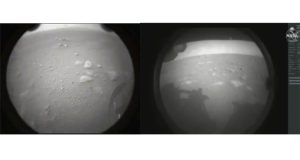 #NASA rover ‘Perseverance’ on a mission in search for past life
#NASA rover ‘Perseverance’ on a mission in search for past life
RNS: NASA successfully landed its fifth rover ‘Perseverance’ on Mars. After its 292.5 million-mile, over the six-month journey from Earth, it landed in a deep crater near the planet’s equator called Jezero, the agency confirmed at 3:55 p.m. ET on Thursday.
Perseverance is NASA’s ninth landing on Mars and the agency’s fifth rover. ‘Perseverance’ touched down the surface of Mars after successfully overcoming a risky landing phase known as the “seven minutes of terror”.
The one-way time it takes for radio signals to travel from Earth to Mars is about 11 minutes, which means the seven minutes it takes for the spacecraft to land on Mars occurs without any help or intervention from NASA teams on Earth, reported CNN.
This rover is the heaviest NASA has ever attempted to land, weighing in at over a metric ton. The spacecraft hit the top of the Martian atmosphere moving at 12,000 miles per hour and had to slow down to 1.7 miles per hour seven minutes later when the rover softly landed on the surface, it reported.
The six-wheeled vehicle will now spend at least the next two years drilling into the local rocks, looking for evidence of past life.
About the size of an SUV, it weighs a ton, is equipped with a seven feet long robotic arm, and has 19 cameras, two microphones, and a suite of cutting-edge instruments to assist in its scientific goals. It has a laser spectrometer on board that will be able to examine rocks using different wavelengths of energy.
Starting from summer, it will attempt to collect around 30 rock and soil samples in sealed tubes, to be eventually sent back to Earth sometime in the 2030s for lab analysis.
President Joe Biden congratulated to the thousands of people involved in the mission. He tweeted about the landing: “Congratulations to NASA and everyone whose hard work made Perseverance’s historic landing possible. Today proved once again that with the power of science and American ingenuity, nothing is beyond the realm of possibility.”
Landing on Mars




